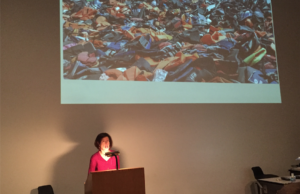International Club speaker shares harrowing tale of quest for freedom

By: Amna Haider
A weary, 12-year-old boy steps out of a crammed bus somewhere in West Africa. He gazes around at a once familiar city, confused. It doesn’t quite register yet, but he knows he escaped. His mind wanders to his family. “Surely they will understand,” he thinks. He traipses along with his two close friends in search of something they might recognize.
Umaru Balde was born in Guinea-Bissau in West Africa. He has travelled around the world before settling in the United States in 2007. He speaks multiple languages including English, French, Spanish, Portuguese, Arabic, Hebrew, Urdu and additional African dialects. Currently, he works at YWCA as the director of Latino and Multicultural immigrants or refugees. Balde says there are often misconceptions of what immigrants or refugees are doing here and who they are.
“There are a lot of misconceptions, who is who and what they are doing here. Taking away jobs of course. And criminals, bad guys, we don’t know them. They don’t have the right to be here,” he said.
The topic of immigration and refugees is a very personal topic for Balde. He has travelled all around Africa and parts of the Middle East, staying in countries as an immigrant as well as refugee before settling in the United States.
Balde’s travel away from home started at a fairly young age when his parents sent him to live with and learn from a religious leader. He was born to a Muslim family and is still a practicing Muslim today. “In our tradition at home, they tend to give kids to religious leaders to raise them up, which means if you are raised up by a priest or pastor, you tend to be a good boy and grow up to be a really good person. [Families] just think that these people are holy men, and your child will grow up to be a holy man as well. So, I was taken to one of these religious leaders, and it turned out to be more like slavery; the kids worked for him every day,” Balde said.
The sheik, a religious leader, that Balde stayed with had several kids living with him at the time, and he made them do everything. “If you know the definition of slavery, we were slaves,” Balde said.
Exhausted, he planned his escape with two other young boys, one of them being his cousin. “I ended up running away when I was 12. We planned it out. I got money from my grandma, and we just decided to jump in the bus and go back to the city, but when we got there, we didn’t know anything about the city anymore. We got lost and asked people a lot of questions. One of them did end up finding his family, but they didn’t let the three of us stay,” Balde said. Disheartened and denied by his own family, he ended up in the streets. At age 14, he joined the rebel’s army in Guinea-Bissau. Balde stayed in the military until age 17, when he decided he wanted to leave the country.
“That was when I started wandering around the world and went through so many countries in Africa that I ended up near the Middle East. [I] later went to school in Egypt. I lived there for eight years and graduated, got my first B.A. and Masters, and then I had to move to Israel,” Balde said.
He entered Israel as a refugee. There was a civil war going on in Guinea-Bissau at the time. “In Israel I went in as a refugee because I did not want to go back to my country. So, yes, I got there, found a job cleaning restaurants for 25 days. I got arrested, of course, for being illegal and not having any documents. Getting into the country illegally, ‘jumping the fence,’ but I did not jump the fence. I cut the fence and crawled,” Balde said.
He was in jail for approximately three months. “When I was taken to jail, I got there, and I saw a lot of people there, actually, from Asia. A lot of people from Thailand, Malaysia and the Philippines and some Africans too, and lots of Russians from Ukraine. Some people there were trafficked, human trafficked. So, I got there and saw all these people, and soon, I made my first friend. He was from Ethiopia. I asked him how long he had been there. He said he had been in that jail for a year and a half. I asked him, ‘What do you do? Who is helping you?’ He said, ‘Well, the human rights people have been trying to get us lawyers for a while now.’ I thought, this is not happening to me, I am not going to do that. So, I started a hunger strike. Actually, my first two days everybody in the jail hated me because I would get up at two o’clock yelling for bread. I just wanted to yell about something. I would bang on the doors. ‘I want bread! I want bread! I’m hungry.’ And [the guards] wouldn’t do anything or just come yell, ‘Shut up!’ So, I started a hunger strike. They would bring lunch, I would dump it. Bring dinner, I would dump it. This went on for two weeks, and I was like a toothpick. Even though I’m used to fasting for a whole month, you get to eat at night, but for a hunger strike, you just drink water,” he said. About two weeks into the hunger strike, the head of the prison facility called Balde into his office to talk. “He asked me why I was doing all of this. I told him I wasn’t doing anything. I just wanted to get out of there. I said, ‘Either you get me out of here or give me to Red Cross. Let them send me back, or give me to somebody else. Just, out, not in prison for years.’ I asked him to get me a lawyer. He said, ‘Oh, so you know the laws.’ I said to him, ‘I don’t know, but I know my basic rights.’”
Balde learned about human rights around the world in a cultural studies class he took during his stay in Egypt. “During that class, the cultural studies class, we learned everything about human rights and how to live in different cultures and how to adapt if you want to and how to assimilate if you want to assimilate, if you are not forced to. In the U.S, you have to assimilate. And so, anyway, he wanted me to come hang out in his office, and he asked if I liked computers. He asked if I wanted to play games on his computer. And I said, ‘Yeah.’ He said, ‘We don’t have Internet.’ I told him, that’s OK. By then, I was already a computer scientist.”
Balde had an interest in computers since he was a young boy. He learned about them from acquaintances in Egypt. “So, I’m sitting there, and I decode his computer and send out an email to the newspaper. So, that’s how they sent these journalists to come and investigate the hunger strike. It became a big deal in Israel,” Balde said.
Balde sent an email to one of the most well known newspapers in Israel, The Haaretz, and the woman who interviewed him, eventually took him in to live with her family for a court-ordered three months.
“When she took me out of [jail], I told her, ‘Look, they only gave me three months to stay with you, and you can keep me for three months and then you can call them to come get me, but they are not going to come find me here, so, I’ll be out. They are not going to find me. I am not going back to jail, and I’m not staying in this country.’ So, I told her the only option if she wanted to help me is that she could go with me to university, and I can get my papers because I knew where I left them. I can get them here in two days, so I can show them all my diplomas and certificates and see if they can accept me into a university,” he said.
Although it was a long shot, they went and tried it out. They sent his papers to a university, and he got accepted. The admissions people were aware of his story due to the news coverage in The Haaretz. Although Balde was a student at university, it was still a fight to keep him there, and his Israeli family was with him every step of the way.
“This family that took me in, they were a jewish family. You would imagine Jewish and Muslims, uh, how is that going to work, right? But, like many people here in Iowa, they accepted me even though they did not know anything about me. They did not think, well, he is a Muslim. He might be a terrorist. He might come here and just wake up one morning and have nice pancakes and go shoot some people, right? It’s not like that. Most people don’t think like that. Unfortunately, some people do. [The government officials] tried to deport me so many times, but they couldn’t because one family accepted me, and they are citizens. My Israeli mom, the one who adopted me, she went to the ministry of interior who takes care of all these [issues], like the homeland security here. She told him, the person there, that if he is going to be deported anywhere, I am going to go with him to make sure he is back to his parents. How many people do you think would do that here [America]? Not that many, unfortunately.”
“My Israeli mom, I can count, for the last eight years that I’ve been here, was only 16 days that she did not call me. She calls every day, but it is not the usual mom worries, ‘Do you drive safe? Do you go to bed on time?” She says, ‘You’re not organizing demonstrations right?’ That’s her concern, all the time. ‘You’re not into these politics right?’ I tell her, Yup I’m fine. I am not yelling at anyone in the streets. She checks every day to make sure I am not in jail,” Balde said.
“Refugees or immigrants are not criminals. They are different. Refugees are running away from something. They are forced to leave their countries. Migrants/immigrants might make the decision. It’s not something that people like to do, but there are these misconceptions that people think, ‘Oh, they are refugees? They are just immigrants coming here for our jobs, and they turn out to be criminals.’ That is not true. I am a good example of that. I studied here. I was a good student at UNI. I got a lot of scholarships. I graduated, and I decided to stay and work in the community. Americans call it, ‘giving back,’ so, I try to give back. I love people, and I work with people from anywhere and everywhere, and all I want to do is help others. Because I live here, whatever happens here, affects me personally. I take everything personally; if it is fun, let’s have fun. If it is sad, let’s all mourn together. What I advocate is together, and the good thing is what makes that happen is learning. We have to learn. If you don’t know people, you will be scared of them. People come here because they feel safe, and they do feel welcomed even if, I didn’t want to say this, but people like Donald Trump, say no … and people will try to come here. It’s never going to stop because they do have the rights. There is something called the Universal Declaration of Human Rights that was passed in 1948,” Balde said.
The Universal Declaration of Human Rights was declared Dec. 16, 1948 in France. It gives the right to people to move from their countries to another country seeking safety. The United States was one of the first 48 countries to sign this treaty.
“Everybody has the right to enjoy in another country, the freedom from being prosecuted. Actually, a lot of people I was in jail with, they live in Israel, but they are given these weekly visas. They have to go sign to let the government know where you are and what you did this week. And if you are working, you have a weekly work permit, so if you don’t go to sign and they don’t know for a week. [Then] the next week, the government officials will come looking for you, and you are going back to prison. And getting out is whole other process. So, these people still live like that or worse. That is why when they get a chance, they are going to go risk their lives in the boats trying to get to Europe or trying to come here. So, if you really have the choice or any other option, you wouldn’t ride on an inflatable boat for 300 miles on the ocean. No one would do that, especially with their mom, dad, kids, little babies or anybody. They think, ‘We are going to risk it. We might make it or not, but anywhere is better than here.’”
“The U.S. takes hundreds of thousands of people every year to come here on green card and all that stuff. In my country, only three or four people get to come here, so, it’s almost impossible. I was lucky. I consider myself lucky.”
Balde had to travel back to his home country, Guinea-Bissau, from Israel to gain a student visa for the United States. “I had to go home although I didn’t really want to. I had to take that risk to see if I could make it here,” Balde said.
The situation in Guinea-Bissau is still terrible to this day. “Since 2012 we had about four different governments. It’s really bad. No one stays in power for more than two years. So, because they are dealing with drug trafficking and the government members, ministers are involved, and they make all their money with from drugs. They [leaders] don’t want to leave. They don’t want the drug trafficking to stop. So, when you try, one person comes and tries to fight against corruption. In two or three days, he gets killed, and then someone else comes, and so on … and that’s been going on for a long time. The country is still very poor. A lot of young people are dying. I read the newspapers every day, and every single day we have a victim, and a lot of them are actually people I know. It’s a pretty sad situation,” Balde said.
Although he was reluctant, he had to go back home if he wanted to go to America. “So, I went home for the first time in 12 years, and I got my visa in two weeks, and then I had to go fly from a neighboring country (Senegal),” Balde said.
He had to stay in Senegal for a couple of days prior to his flight. “I was talking to my dad on Monday. He said to me, ‘I want to make sure you get your flight, and if you are going to stay in a few days in Senegal, why don’t I go with you? Because if you are in Africa spending those two days or few hours, I want to spend as much time with you as I can.’ So, we decided to leave, he decided to go with me,” Balde said.
The bus ride to Senegal was supposed to be approximately nine hours, but five hours into the trip, their bus broke down. Balde and his father switched buses to continue their journey. “We moved to another truck and switched seats. So, where my dad was supposed to sit, I sat. An hour into the drive, we got into an accident,” Balde said. His father suffered horrible injuries and died two weeks later in Senegal. “I took him again and went back home for the funeral, and then two days after the funeral, I moved to America. So, it was a very stressful situation. Yeah, it was crazy, but I made it,” Balde said.
After his long path, Balde remains hopeful. He has seen many struggles, and he knows the path to acceptance is never easy.
“I wish people would really be a little more tolerant and more willing to learn from refugees and what exactly these people are going through and why these people are coming here. I wish people would try to learn, to know because a lot of people don’t. They just assume.”








You must be logged in to post a comment Login